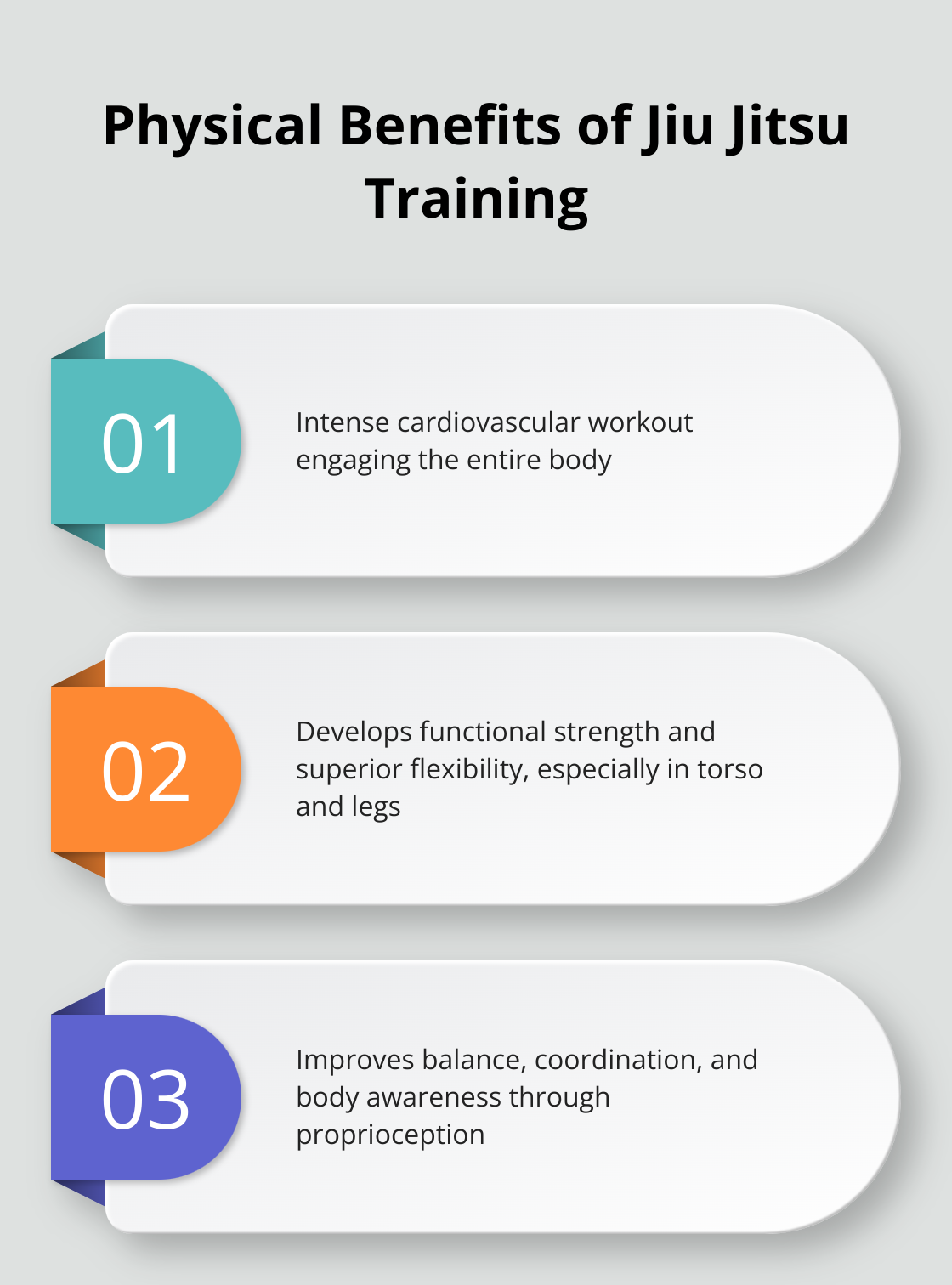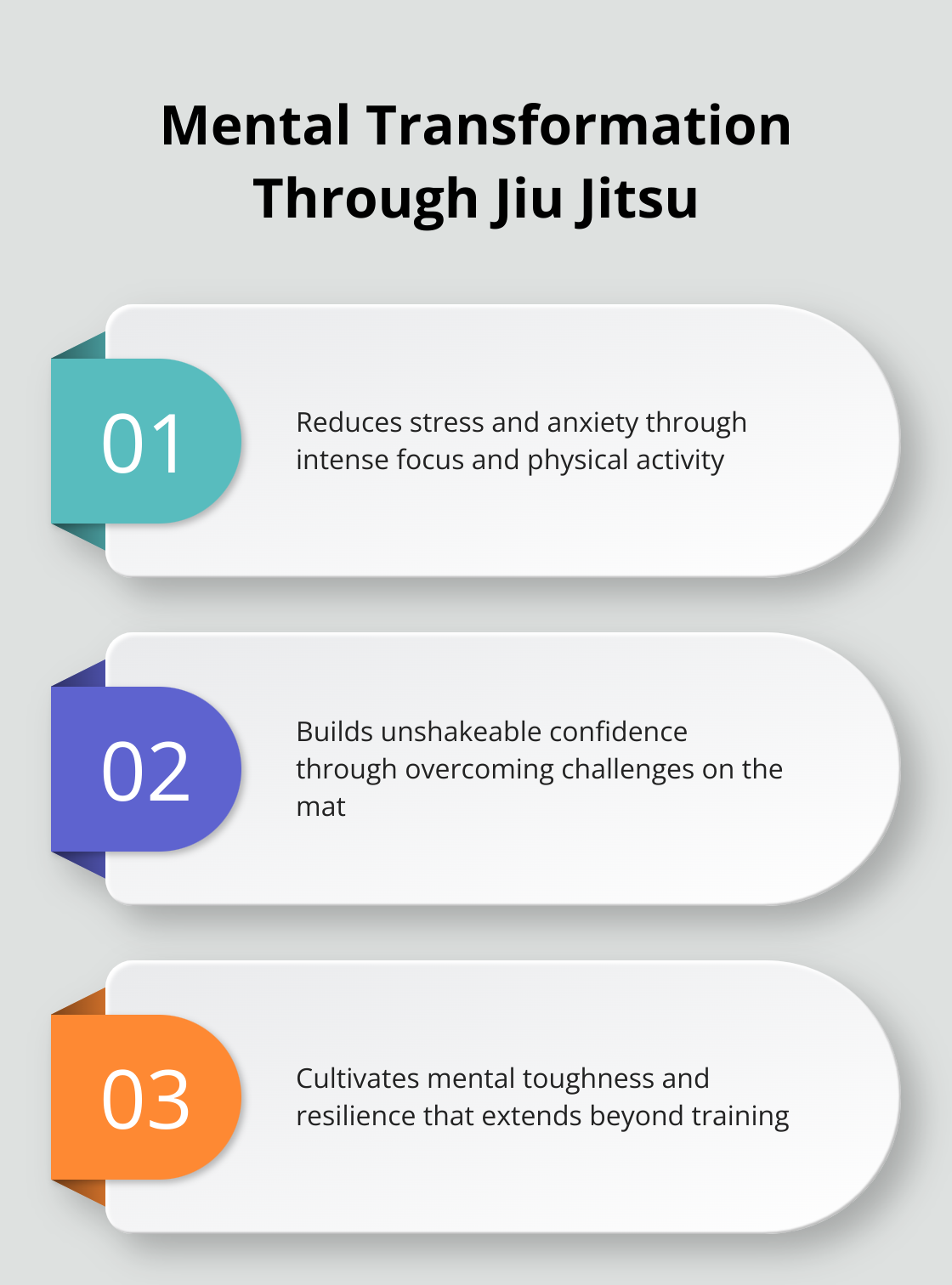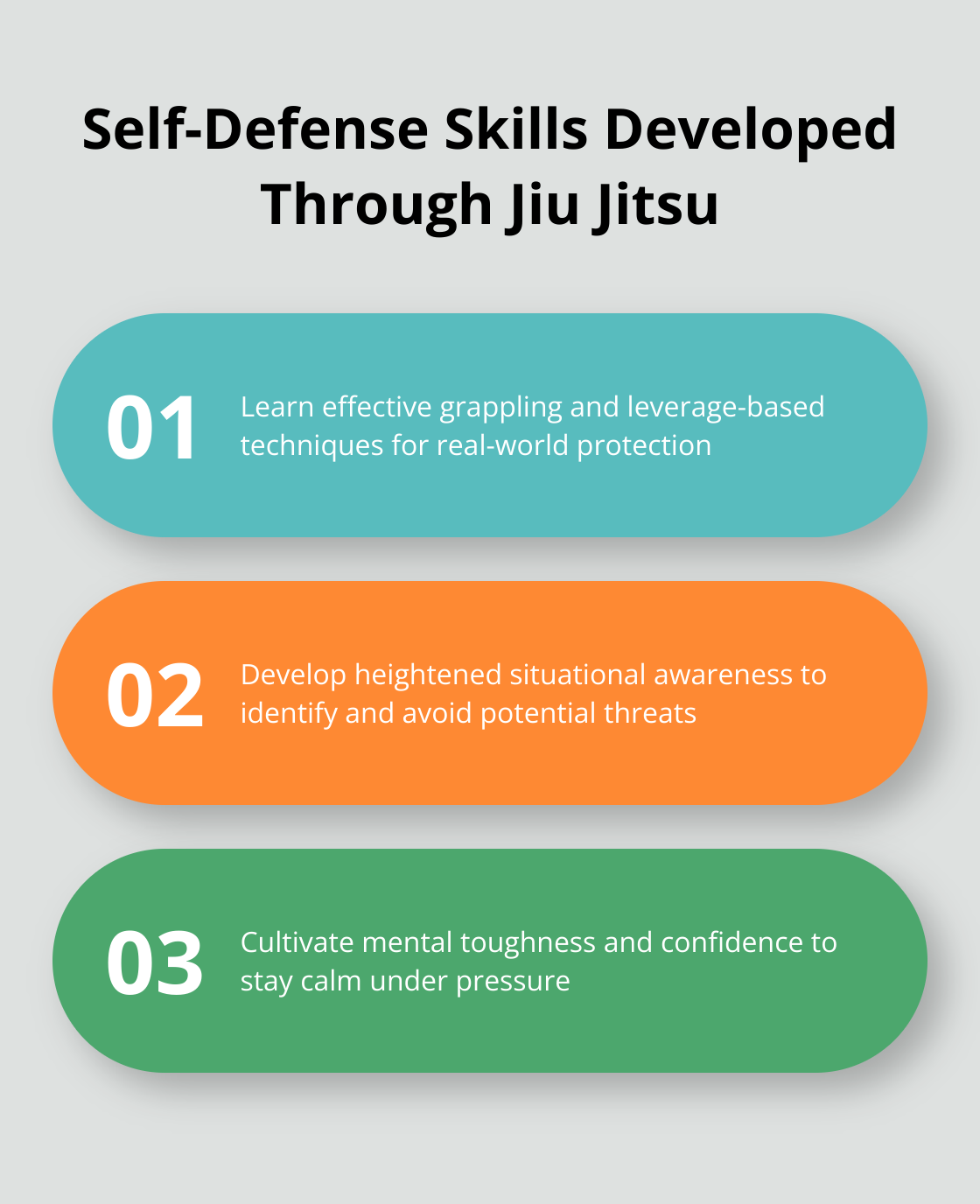At Jiu Jitsu, we often get asked about the benefits of Jiu Jitsu training. The truth is, regular practice offers a wealth of advantages that extend far beyond the mat.
From physical fitness to mental resilience and practical self-defense skills, Jiu Jitsu is a powerful tool for personal growth and development. In this post, we’ll explore how consistent training can transform your body, mind, and overall well-being.
Physical Transformation Through Jiu Jitsu
A Full-Body Cardiovascular Workout
Jiu Jitsu training offers an intense cardiovascular workout that engages your entire body. Studies substantiate that the vigorous activities inherent in Jiu-Jitsu training sessions lead to substantive cardiovascular improvements.
Building Functional Strength and Flexibility
Unlike isolated weightlifting exercises, Jiu Jitsu develops functional strength that translates to real-world activities. Grappling, escaping, and executing techniques require full-body engagement, which leads to increased muscle tone and overall strength. Research indicates that experienced BJJ athletes demonstrate superior flexibility compared to novices, particularly in the torso and legs. This enhanced flexibility not only improves performance on the mat but also reduces the risk of injuries in daily life.
Mastering Balance and Body Control
Jiu Jitsu training hones your proprioception – your body’s ability to sense its position in space. As you practice techniques and spar with partners, you’ll develop exceptional balance and coordination. This improved body awareness extends beyond the mat, benefiting you in various physical activities and reducing the likelihood of falls or accidents.
Weight Management and Body Composition
Regular Jiu Jitsu practice contributes significantly to weight management and improved body composition. The high-intensity nature of training (combined with the technical aspects of the sport) creates a perfect environment for fat loss and muscle gain. Many practitioners report a noticeable decrease in body fat percentage and an increase in lean muscle mass within the first few months of consistent training.
Injury Prevention and Recovery
While Jiu Jitsu is a contact sport, it also teaches valuable skills for injury prevention. Learning proper falling techniques (breakfalls) can reduce the risk of injury during everyday activities. Additionally, the gradual progression of training helps build joint stability and muscular endurance, which can prevent common sports-related injuries. For those recovering from injuries, Jiu Jitsu offers a controlled environment to rebuild strength and mobility under expert guidance.
As we explore the physical benefits of Jiu Jitsu, it’s important to recognize that these improvements often lead to significant mental and emotional changes. The discipline required to consistently show up on the mat, face challenges, and push through discomfort builds a resilience that extends far beyond physical fitness.

How Jiu Jitsu Transforms Your Mind
Stress and Anxiety Reduction
Jiu Jitsu offers a powerful outlet for stress relief. The intense focus required during training acts as a form of moving meditation, allowing practitioners to disconnect from daily worries. The Anxiety and Depression Association of America reports that regular physical activity is very effective at reducing fatigue, improving alertness and concentration, and enhancing overall cognitive function. Many students experience a sense of calm and centeredness after just a few weeks of consistent training.
Unshakeable Confidence Building
As you progress in Jiu Jitsu, you face and overcome numerous challenges on the mat. Each small victory (executing a new technique or surviving a tough roll) contributes to a growing sense of self-confidence. This newfound self-assurance often extends beyond the gym, positively impacting personal and professional relationships.
Mental Toughness Cultivation
Jiu Jitsu training demands perseverance and resilience. You learn to push through discomfort, both physical and mental, developing a level of mental toughness that serves you well in all areas of life. This grit and determination often translate into increased productivity and goal achievement outside the gym.
Focus and Decision-Making Enhancement
The dynamic nature of Jiu Jitsu requires split-second decision-making and unwavering focus. Regular practice hones these skills, improving your ability to concentrate and make quick, effective decisions under pressure. Many practitioners find that this enhanced mental acuity carries over into their work and personal lives, leading to improved performance and problem-solving abilities.
Jiu Jitsu training programs maximize these mental and emotional benefits. Experienced instructors create a supportive environment where you can challenge yourself, grow, and reap the full rewards of Jiu Jitsu training. Whether you want to reduce stress, boost confidence, or sharpen your mind, Jiu Jitsu classes offer a path to holistic self-improvement.
The mental transformation experienced through Jiu Jitsu training complements the physical benefits, creating a well-rounded approach to personal development. This combination of mental and physical growth naturally leads to enhanced self-defense capabilities, which we’ll explore in the next section.

Practical Self-Defense Skills for Real-World Safety
Effective Techniques for Personal Protection
Jiu-Jitsu teaches effective techniques for personal protection that work in real-world scenarios. Unlike martial arts that rely on flashy kicks or punches, Jiu-Jitsu emphasizes grappling, leverage, and ground fighting. These techniques allow a smaller, weaker person to defend against a larger, stronger attacker.
Students learn to escape from common holds and grabs (such as wrist grabs or bear hugs). Simple yet powerful moves like the technical stand-up allow you to safely return to your feet if taken to the ground. For example, a well-executed armbar can immobilize a much larger opponent, allowing the practitioner to escape or gain control of the situation. These techniques don’t require exceptional strength or athleticism, making them accessible to practitioners of all ages and fitness levels.
Situational Awareness: Your First Line of Defense
A key component of self-defense that many overlook is situational awareness. Exercises and drills sharpen your ability to assess your environment and identify potential threats before they escalate.
Students learn to be mindful of their surroundings, recognize warning signs, and trust their instincts. This heightened awareness extends beyond the training mat and into daily life, helping you avoid dangerous situations altogether. It’s about proactive rather than reactive behavior.
Mental Toughness and Confidence Building
The most transformative aspect of self-defense training is the mental fortitude it develops. Through consistent practice and controlled pressure testing, students build unshakeable confidence in their abilities.
This confidence isn’t about aggression or confrontation. It’s about knowing you have the skills to protect yourself if necessary. This self-assurance often deters potential attackers, as confident individuals are less likely to be targeted.
The mental toughness gained through training helps you stay calm and make clear decisions in high-stress situations. This composure can make the difference between escalating a confrontation and defusing it safely.
Comprehensive Approach to Personal Safety
Effective self-defense is about more than just physical techniques. It’s about developing a comprehensive set of skills that empower you to navigate potentially dangerous situations with confidence and composure. Training programs focus on three key areas: effective techniques, situational awareness, and mental preparedness.
Real-World Application of Skills
Self-defense training cultivates a mindset of preparedness and resilience. The goal is to equip you with the physical skills, situational awareness, and mental fortitude to navigate the world with confidence and security. Whether you’re a beginner or an experienced martial artist, these programs offer a path to practical, real-world self-defense proficiency.

Final Thoughts
The benefits of Jiu Jitsu training transform practitioners physically, mentally, and emotionally. Regular practice sculpts the body through intense workouts, builds functional strength, and enhances flexibility. Jiu Jitsu also sharpens the mind, fosters resilience, and cultivates unwavering confidence that extends beyond the mat.
Souza Grappling Co. offers a supportive environment where individuals can experience these benefits firsthand. Our state-of-the-art facility, expert instructors, and vibrant community provide the perfect setting for your Jiu Jitsu journey. Whether you seek physical fitness, mental clarity, or practical self-defense skills, Jiu Jitsu offers a comprehensive path to personal growth and empowerment.
We encourage you to take the first step and discover the transformative power of Jiu Jitsu for yourself. Join us at Souza Grappling Co. and unlock your full potential both on and off the mat. Your path to a stronger, more confident, and more capable you starts here.




